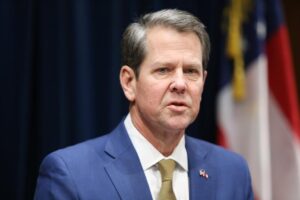Hochul Shows Shades of Green, Offering Hope She’ll Kill Queens Fossil Fuel Plant

Gov. Kathy Hochul’s support of two new electricity transmission lines to bring clean energy into the city is giving some hope to opponents of a proposed fossil fuel power plant in Queens.
For more than a year, environmental advocates have been protesting against energy company NRG’s plan to replace a half-century-old electrical “peaker” plant in Astoria with a newer type of gas-powered facility. NRG contends gas is necessary for reliability.
Peakers are highly polluting plants, emitting more nitrogen oxide and carbon dioxide per unit of electricity than typical power facilities. They run when electricity demand is high, during cold weather or heat waves. Residents nearby breathe in those toxins, causing and exacerbating respiratory illnesses such as asthma.
Hochul on Monday threw her support behind two transmission line proposals to bring clean power to New York City from as far as Canada and say goodbye to fossil fuels — a move that environmentalists hope will pave the way for the state to deny permits for the Astoria project.
“With new transmission lines, we can shut down more peaker plants,” said Annel Hernandez, associate director of the New York City Environmental Justice Alliance. “But whether or not we’re building new transmission lines, which are needed, it’s already proven we don’t need the Astoria project.”
‘Replace Dirty Polluting Plants’
Hochul has not said whether she opposes the NRG plant, and on Tuesday declined to address the question directly.
“My goal in creating these new transmission lines — and it sounds like a long way off — my goal is to replace these dirty polluting plants throughout the city,” Hochul said, appearing on the roof of the Javits Center for a Climate Week announcement.
Hochul is one of the few local elected officials who has not weighed in on the project. The plan has garnered opposition from Mayor Bill de Blasio, Senate Majority Leader Chuck Schumer, Reps. Carolyn Maloney and Alexandria Ocasio-Cortez, state Sens. Jessica Ramos and Michael Gianaris, and Assemblymembers Zohran Mamdani and Jessica González-Rojas, among others.
Still, Hochul’s comments suggested she may not be convinced by NRG’s arguments that the new plant would be necessary to ensure energy reliability, said Alex Beauchamp, Food and Water Watch’s Northeast region director.
“It shows the governor is excited about a future where we’re not reliant on fossil fuels,” he said. “We can get there through a mix of expanding renewables and expanding transmission and battery storage…. I’m hopeful this can be the side of real commitment from her to choose renewables.”
In August, the state Department of Environmental Conservation indicated the Astoria project did not comply with the state’s environmental law that mandates greenhouse gas emissions cuts — something Commissioner Basil Seggos reiterated Tuesday. The DEC is expected to make a decision on the plan in the coming weeks.
A spokesperson for NRG did not respond to a request for comment. But according to the company, the replacement project will result in lower greenhouse gas emissions, cheaper electric rates and better air quality compared to the current 50-year-old unit.
Eventually, the company said, the plant will run on renewable hydrogen. But that’s a “vague promise,” said Rachel Spector, a senior attorney with EarthJustice who earlier this month filed comments opposing the Astoria project on behalf of several local environmental and community groups.
The future transmission lines Hochul supports “are one big part of the reason the Astoria plant is not necessary,” Spector said.
Another part, she pointed out, is because Con Ed is at work on a series of transmission projects and grid upgrades. Those efforts, according to the Public Service Commission, which approved them, would meet reliability needs and would allow the Astoria peaker to retire.
Green ‘Extension Cords’
The first is the Champlain Hudson Power Express, which would bring hydropower along a 339-mile-long route from Canada to Con Edison’s Rainey substation on Roosevelt Island. The second is the Clean Path New York line, which would run 174 miles from Delaware County to Astoria, carrying solar, wind and hydropower.
Hochul described the projects as “extension cords” that would help move renewable energy and play key roles in achieving state goals — including 70% energy generated from renewable sources by 2030.
The lines would be able to power 2.5 million homes combined, Hochul said — helping to retire fossil fuel-powered plants while generating thousands of jobs.
It’s up to the Public Service Commission to finalize the projects, which electric customers would help subsidize. Negotiations of contracts for purchasing the power are in the works, but New York City is slated to buy some of that juice.
If approved, the Champlain Hudson Power Express would break ground in 2025, with construction on Clean Path New York beginning two years later.
The transmission lines, plus what the state has so far contracted for offshore wind, would power half of New York City’s annual electric consumption, according to Doreen Harris, CEO and president of the New York State Energy Research and Development Authority (NYSERDA).
And de Blasio said the projects would lead to 100% renewable electricity powering “all New York City government” by 2025.
‘Detrimental Effects’ Feared
But environmental groups have expressed concerns about the proposed Champlain Hudson Power Express.
The Champlain Hudson Power Express “has questionable climate benefits and also has some really significant human rights implications because of opposition from First Nations in Canada,” said Shay O’Reilly, a senior organizing representative for Sierra Club’s Beyond Coal campaign.
Indigenous groups in Canada have expressed concerns over other international transmission projects by Hydro-Quebec, the public utility company that would oversee the generating assets for the Champlain Hudson Power Express.
In a letter sent to city officials in May, a coalition of five First Nations in northern Quebec denounced and condemned the “detrimental effects” of the transmission line.
“The said project would additionally cause serious and, possibly, irreversible damage to the natural environment on which our communities depend and on which our culture is based,” they wrote.
Part of the concern would be the possibility of the company building more dams to generate more hydropower, which would harm local communities.
Lynn St-Laurent, a Hydro-Quebec spokesperson, said the power sent to New York would come from the company’s existing facilities. She said there are no plans to build more dams “for the foreseeable future,” and any new additions would be from “wind power and energy efficiency measures.”
St-Laurent added that the company “seeks to maintain collaborative and sustainable relationships” with indigenous communities — and pointed out the joint ownership agreement the company forged with the Mohawk Council of Kahnawake regarding the Champlain Hudson Power Express.
Thinking Locally
Still, environmental advocates say the best way to produce power with the most benefits — health, environmental and economic — would be to generate and store renewable energy locally.
“Buying hydropower from a foreign country is not the way to spur a just transition in New York City, in New York State. It’s not the way to catalyze job creation,” Hernandez said.
The Champlain Hudson Power Express would directly create 485 full-time construction jobs and 40 full-time permanent jobs in New York, according to an estimate commissioned by the developer, Transmission Developers Inc.
Hydro-Quebec and Transmission Developers have also committed $40 million to provide job training to residents living along the route.
The DEC is reviewing the more than 9,000 comments submitted about NRG’s proposal, said Jeff Wernick, a DEC spokesperson.
Spector said a lot is riding on the DEC’s decision.
“This will be a huge signal in how [the state’s] going to implement the climate law,” given the mandate to achieve an emissions-free electric sector by 2040, she said. “You can’t build fossil fuel infrastructure now because it is not a way to get to where we need to go.”
This article was originally posted on Hochul Shows Shades of Green, Offering Hope She’ll Kill Queens Fossil Fuel Plant







